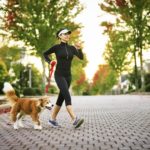Why Are My Muscles Sore?
What is delayed onset muscle soreness? My trainer told me about it. I’d never heard of it, and I wonder what can be done about it.
Andrew Weil, M.D. | November 28, 2011

Delayed onset muscle soreness (DOMS) refers to the aftereffects of strenuous exercise that come on 24 to 48 hours following a workout. Exercise physiologists say this is a normal consequence of overusing or stressing a muscle beyond its normal use and stems from microscopic tears in muscle fibers. The soreness usually occurs after using muscles to perform “eccentric” contractions – one example is the controlled extension of your arm after performing a bicep curl; another is running downhill. This delayed muscle soreness is common. It affects elite athletes who challenge themselves as well as newcomers to exercise, but almost everyone experiences it at some point after engaging in unaccustomed activity. It usually passes within a few days.
There’s no sure cure for DOMS and considerable disagreement as to what works best to ease the pain. You can try rest, ice, an over-the-counter anti-inflammatory drug, or heat (as from the packaged heat wraps you can buy in drug stores). Massage or stretching may also be helpful, and I’ve read one study that showed drinking tart cherry juice may help reduce symptoms. This study also found that loss of strength associated with the soreness was only four percent in those who received the cherry juice, compared to 22 percent in those who drank a placebo. The anthocyanin pigments that give tart cherries their color are likely responsible for their anti-inflammatory, analgesic effects.
If you’re new to exercise, your best bet is to take it easy or stick to light exercise for a few days when you first encounter delayed onset muscle soreness. Don’t let DOMS discourage you from continuing with your program.
Be sure to distinguish routine muscle soreness and stiffness from the pain of injury. Muscle sprains or strains due to exercise cause sudden, intense pain, often associated with swelling or bruising.
Andrew Weil, M.D.









